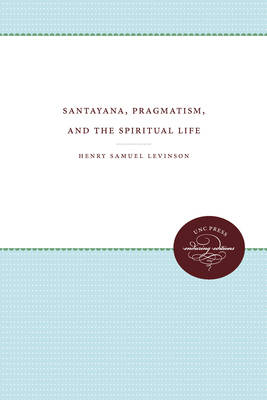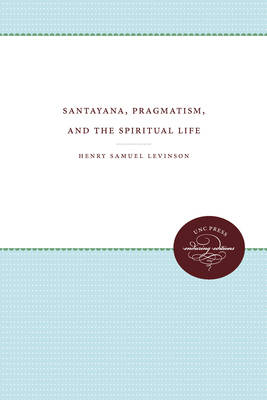
- Retrait gratuit dans votre magasin Club
- 7.000.000 titres dans notre catalogue
- Payer en toute sécurité
- Toujours un magasin près de chez vous
- Retrait gratuit dans votre magasin Club
- 7.000.000 titres dans notre catalogue
- Payer en toute sécurité
- Toujours un magasin près de chez vous
88,95 €
+ 177 points
Description
Henry Levinson offers a major reinterpretation of the Spanish-born American philosopher George Santayana (1863-1952), which highlights his relationship to the tradition of American pragmatism. He shows that Santayana's role in forming the pragmatist tradition was greater than has usually been recognized and that Santayana has much to offer contemporary pragmatists.
Levinson puts Santayana at the forefront of pragmatism by emphasizing his reflections on the cultural structures that shape human life and expression. He explores Santayana's interest in solitude and society, his poetic construals of religious thought and ritual, his institutional rendition of pragmatism, and his concern to distinguish spirituality and politics. In doing so, he gives attention to Santayana's precursors, like Ralph Waldo Emerson; to his teachers and colleagues, including William James and Josiah Royce; to other pragmatists of his time, such as John Dewey and Sidney Hook; and to contemporary writers, including Richard Rorty and Milan Kundera.
Levinson's book illuminates an area neglected in both American literary history and the history of pragmatism. No other book has so carefully and centrally focused on the development of Santayana's scholarship, and no other author captures the way in which Santayana's concern with spirituality connects his earlier and later works.
Originally published in 1992.
A UNC Press Enduring Edition -- UNC Press Enduring Editions use the latest in digital technology to make available again books from our distinguished backlist that were previously out of print. These editions are published unaltered from the original, and are presented in affordable paperback formats, bringing readers both historical and cultural value.
Levinson puts Santayana at the forefront of pragmatism by emphasizing his reflections on the cultural structures that shape human life and expression. He explores Santayana's interest in solitude and society, his poetic construals of religious thought and ritual, his institutional rendition of pragmatism, and his concern to distinguish spirituality and politics. In doing so, he gives attention to Santayana's precursors, like Ralph Waldo Emerson; to his teachers and colleagues, including William James and Josiah Royce; to other pragmatists of his time, such as John Dewey and Sidney Hook; and to contemporary writers, including Richard Rorty and Milan Kundera.
Levinson's book illuminates an area neglected in both American literary history and the history of pragmatism. No other book has so carefully and centrally focused on the development of Santayana's scholarship, and no other author captures the way in which Santayana's concern with spirituality connects his earlier and later works.
Originally published in 1992.
A UNC Press Enduring Edition -- UNC Press Enduring Editions use the latest in digital technology to make available again books from our distinguished backlist that were previously out of print. These editions are published unaltered from the original, and are presented in affordable paperback formats, bringing readers both historical and cultural value.
Spécifications
Parties prenantes
- Auteur(s) :
- Editeur:
Contenu
- Nombre de pages :
- 362
- Langue:
- Anglais
Caractéristiques
- EAN:
- 9780807871058
- Date de parution :
- 01-06-12
- Format:
- Livre broché
- Format numérique:
- Trade paperback (VS)
- Dimensions :
- 152 mm x 226 mm
- Poids :
- 521 g







